| Srl | Item |
| 1 |
ID:
082368
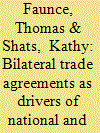

|
|
|
|
|
| Publication |
2008.
|
| Summary/Abstract |
This article compares controversial health technology provisions in two important United States free trade agreements with developed nations: Australia and with South Korea. It examines the multinational corporate forces behind the medicines and medical devices components of these texts and their likely impacts upon Australian trade negotiations with China and India. It also examines the implications of some recent changes to US trade policy for this area in subsequent bilateral deals such as that with Peru. This article argues it is important that the Australian government change policy and, like the present Congress in the United States, now systematically approach such impending trade agreements with a view to assisting the partners' regulatory frameworks to maximally enhance national and transnational benefit from their medicines and biotechnology industries
|
|
|
|
|
|
|
|
|
|
|
|
|
|
|
|
| 2 |
ID:
092336
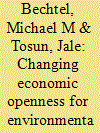

|
|
|
|
|
| Publication |
2009.
|
| Summary/Abstract |
Citizens' concerns about (international) environmental protection standards are of increasing importance to governments in industrially advanced, high-regulating countries. In almost any proposal for a trade agreement, countries with low environmental regulation standards are required to introduce higher policy standards in exchange for high-regulating countries dismantling their trade barriers and granting access to their domestic markets. Low-regulating countries often act as required and introduce legislation aimed at reducing pollution. This leads to declaratory or de jure policy convergence. But such legislative action is not always associated with de facto or actual policy convergence, since policies are not always enforced. To analyze the strategic aspect of this potential "slippage," we set up a game-theoretic model with imperfect information. In the model, a high-regulating and a low-regulating country negotiate a bilateral free trade agreement with environmental provisions. We show how potential gains from trade, policy enforcement, and reputation costs, as well as domestic demands for environmental protection affect the occurrence of environmental policy convergence through conditional trade agreements. This study thereby advances our understanding of the relationship between bilateral trade and convergence of environmental policies.
|
|
|
|
|
|
|
|
|
|
|
|
|
|
|
|
| 3 |
ID:
068689
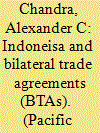

|
|
|
| 4 |
ID:
140042
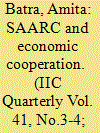

|
|
|
| 5 |
ID:
121988
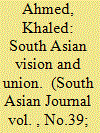

|
|
|